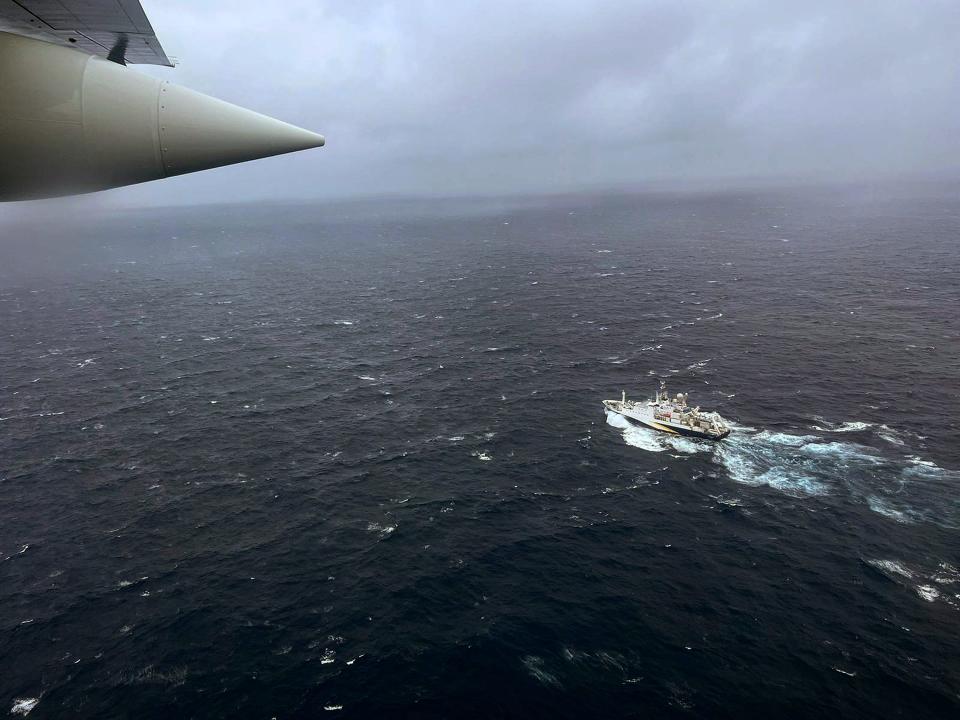Titan submersible tragedy could lead to lawsuits and regulatory changes, experts say
The catastrophic implosion of a submersible with a history of safety concerns has put a spotlight on the ways the company that built it, OceanGate, was able to circumvent regulations in the small industry. OceanGate CEO Stockton Rush, one of the five people who died on the Titan submersible, criticized industry safety standards and was able to skirt them by operating in international waters.
“Bringing an outside entity up to speed on every innovation before it is put into real-world testing is anathema to rapid innovation,” Rush wrote in a 2019 blog post on his company’s website explaining why the Titan was not certified by a maritime industry group that sets safety standards.

Now, the Titan's implosion on its mission to the wreck of the Titanic in the North Atlantic could lead to lawsuits and a new push for regulatory changes, experts said. Though it's unclear how likely these efforts are to succeed, previous high-profile tragedies, including the sinking of the Titanic itself, resulted in major legal fallout and public outcry.
"The next step, it's not a technical issue," said Will Kohnen, chair of the Manned Underwater Vessels committee of the Marine Technology Society, a professional organization based in Washington, D.C. "It's a political one."
Titan deaths may provide 'window' for new regulations
The submersible industry's regulations have effectively prevented major accidents for decades, Kohnen said. He said that while submersibles for personal use may not need to be certified, if the vessel is being used for tourism or commerce it must be classified by a third-party engineering firm, such as Lloyd's Register in the United Kingdom or the American Bureau of Shipping.
But certification requirements apply only in areas controlled by certain countries, according to Kohnen, one of dozens of experts in the industry who sent a letter to OceanGate in 2018 saying they had "unanimous concern" about the company's development plans and marketing.
Though Titan, which intended to bring passengers to depths of more than 13,000 feet, was not certified, Kohnen estimated 90 to 95% of submersibles are.
"There are 10 submarines in the world that can go to that depth and deeper, and all of them are certified," Kohnen said. "Titan was the outlying exception for that."
Kohnen said a group such as the International Maritime Organization, a United Nations agency that regulates shipping, would have to step in to regulate submersibles operating in international waters.
"This might just give us a little bit of an open window where they pay attention to us."
More: Titanic sub took on extreme danger, while 'breaking the rules'
A spokesperson for the International Maritime Organization said that while the organization has developed guidelines on submersibles, it does not have regulations for deep-sea exploration. Any regulatory changes would need to be proposed by a member state, according to the IMO.
Salvatore Mercogliano, a professor at Campbell University in North Carolina who focuses on maritime history and policy, said Canada may see changes "immediately" because Titan was launched from the Canadian icebreaker Polar Prince.
Without international regulations, ship operators will probably find it easy to get around any new rules made by individual countries, said Martin Davies, director of the Maritime Law Center at Tulane University in Louisiana. And despite the media attention, he said, tragedies on submersibles like the Titan are "not going to happen often enough to require some international regulation to make sure that it doesn't happen again."
"For the IMO, I would reckon the migrant crisis is a more pressing issue than regulating submersible vessels, to be honest," he said.
'A difficult road ahead' for potential lawsuits
Maritime law experts said the families of the passengers who died on Titan probably will sue. But the waiver their loved ones signed may present significant challenges, and it is unclear exactly where and how lawsuits could play out.
CBS reporter David Pogue, who rode the Titan last year with Rush for a CBS report that aired in November, told USA TODAY the safety waiver included many clauses specifying ways passengers might be permanently injured or killed.
“An experimental submersible vessel that has not been approved or certified by any regulatory body ... could result in physical injury, disability, emotional trauma or death,” Pogue read off a form in his CBS report before asking, “Where do I sign?”
"The U.S. probably would uphold those waivers of liability, in which case they would not be able to recover damages," said Thomas Schoenbaum, a University of Washington law professor and author of "Admiralty and Maritime Law."
But the waiver and the company's ownership may influence where a lawsuit is filed and what nation's laws apply.
Rush, the OceanGate CEO, told The Associated Press in 2021 that OceanGate was an American company, but OceanGate Expeditions, which led dives to the Titanic, was based in the Bahamas.
Davies said it may be possible to sue in the United States under the Death on the High Seas Act, which he said provides a legal remedy for the surviving relatives of people who have died as a result of fault on the high seas. He said they could possibly file suit in Canada, because the submersible was launched from a Canadian vessel. But if the waiver dictates where a lawsuit has to be filed, Davies said, it's "quite likely" it would have to be filed in the Bahamas, the home country of the subsidiary.
Davies said it's also unclear whether the Titan was insured or covered under the ship's liability insurance.
"I would be surprised if there isn't litigation arising from this disaster, but I think they've got a difficult road ahead of them," he said.
Contributing: The Associated Press; Jeanine Santucci and Anthony Robledo, USA TODAY
This article originally appeared on USA TODAY: Titan submersible tragedy could lead to lawsuits, regulatory changes

